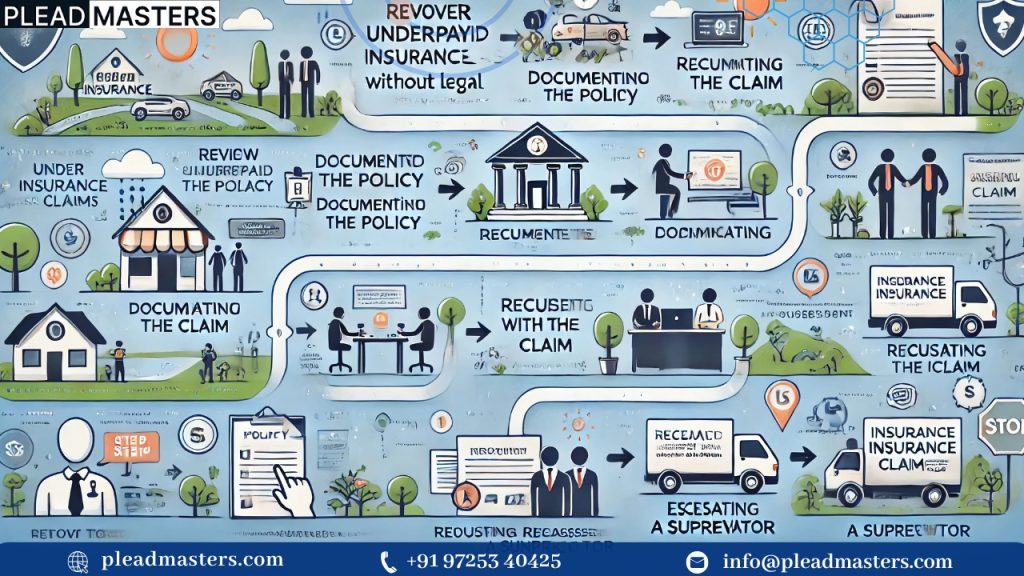Step-by-Step Process to Recover Underpaid Insurance Claims Without Legal Complications


Underpaid insurance claim can be a frustrating experience, especially when you have diligently paid your premiums only to receive less than you expected when filing a claim. Fortunately, there are effective ways to address and recover underpaid claims without resorting to legal action. By following a systematic approach, you can resolve discrepancies with your insurance provider while maintaining a professional and constructive relationship.
This guide will walk you through the step-by-step process of recovering underpaid insurance claims while ensuring your efforts are organized, effective, and legally sound.
1. Review Your Policy Thoroughly
Before contacting your insurance company, take time to review your insurance policy in detail. Understanding the terms, coverage limits, exclusions, and deductibles will give you a clear perspective on what you’re entitled to claim. Pay special attention to:
- Coverage specifics: What incidents or damages are covered under your policy?
- Policy limits: Is there a cap on the amount the insurance will pay?
- Exclusions: Are there circumstances under which the claim could be reduced or denied?
Having a strong grasp of your policy will enable you to identify potential discrepancies in the payout.
2. Organize Your Documentation
Well-organized documentation is critical when disputing an underpaid insurance claims. Gather all relevant records, including:
- The original insurance policy document
- Proof of premium payments
- A copy of the claim you submitted
- The insurance company’s settlement offer
- Receipts, invoices, or estimates related to the damages or loss
- Photos or videos documenting the extent of the damages
Having this information readily available will streamline communication and strengthen your case.
3. Compare the Settlement Offer to Your Policy
Carefully compare the payout amount offered by your insurer to the terms outlined in your policy. Identify the specific areas where the settlement falls short, such as:
- Items or damages that were overlooked
- Incorrect application of depreciation
- Misinterpretation of policy terms
Highlight these discrepancies to use as a reference in your discussions with the insurance company.
4. Contact Your Insurance Adjuster
Reach out to the insurance adjuster assigned to your claim. Politely explain your concerns and provide evidence supporting your case. During the conversation:
- Maintain a professional and respectful tone.
- Stick to the facts and avoid emotional arguments.
- Request clarification on how the payout amount was calculated.
Document the conversation, including the date, time, and details of what was discussed, to ensure you have a record of your interactions.
5. Request a Reassessment of Your Claim
If the initial discussion does not resolve the issue, formally request a reassessment of your claim. This can be done by submitting a written appeal to your insurance company. Include:
- A clear explanation of the discrepancies
- Supporting documents and evidence
- A specific request for a revised settlement amount
Make sure your appeal is concise and well-organized to improve the chances of a favorable outcome.
6. Hire a Public Adjuster (If Necessary)
If you’re unable to reach a satisfactory resolution, consider hiring a licensed public adjuster. Public adjusters are independent professionals who advocate on behalf of policyholders and help negotiate with insurance companies. They can:
- Assess the value of your claim
- Provide expert insights into your policy
- Handle communications with the insurance provider
Ensure that the adjuster you hire has a good reputation and experience in handling similar cases.
7. Explore Mediation or Arbitration
Many insurance policies include clauses for alternative dispute resolution methods such as mediation or arbitration. These methods are less formal and costly than litigation and can help resolve disputes efficiently. During mediation or arbitration:
- Present your case with supporting evidence
- Stay open to compromise and fair resolutions
Check your policy or consult with your insurance company to determine if these options are available.
8. File a Complaint with the State Insurance Department
If you’re still unsatisfied with the outcome, you can file a complaint with your state’s insurance department. These regulatory bodies oversee insurance companies and ensure they comply with state laws. To file a complaint:
- Visit the official website of your state’s insurance department.
- Provide detailed information about your claim and the issues encountered.
- Include copies of all relevant documents.
The insurance department may investigate your complaint and facilitate a resolution.
9. Consider Legal Action as a Last Resort
If all else fails, legal action may be your last option. However, this should only be pursued after exhausting all other avenues. Litigation can be time-consuming and costly, so weigh the potential benefits against the expenses. Consult an attorney specializing in insurance law to assess the strength of your case.
Tips to Avoid Future Underpayment Issues

- Maintain a Detailed Inventory: Keep a record of your possessions, including receipts and photos, to substantiate claims.
- Communicate Clearly: Provide accurate and detailed information when filing claims.
- Review Your Policy Annually: Regularly update your coverage to ensure it meets your needs.
- Work with Trusted Providers: Choose reputable insurance companies with strong customer service records.
Conclusion
Recovering underpaid insurance claim can be a complex process, but it’s often possible to achieve a fair resolution by following a systematic and professional approach. By thoroughly reviewing your policy, organizing your documentation, and engaging constructively with your insurer, you can resolve disputes effectively without resorting to legal complications. Remember, persistence and clarity are key to ensuring you receive the compensation you rightfully deserve.
Frequently Asked Questions (FAQs)
1. How should I handle underpaid insurance claim?
Begin by reviewing your policy to understand your coverage and comparing the payout to your policy’s terms. Gather all necessary documentation and discuss your concerns with the insurance adjuster. If the issue remains unresolved, consider filing an appeal or hiring a public adjuster.
2. Can I dispute an insurance claim payout without hiring a lawyer?
Yes, you can dispute an underpaid claim without legal assistance by organizing your documentation, appealing to your insurer, or exploring mediation or arbitration. Legal action should be a last resort.
3. How can I ensure my insurance claim is not underpaid in the future?
Maintain a detailed inventory of your possessions, communicate clearly when filing claims, and review your insurance policy regularly to ensure adequate coverage.
4. What is the role of a public adjuster?
A public adjuster is an independent professional who helps policyholders assess and negotiate insurance claims. They act on your behalf to ensure you receive a fair settlement.
5. When should I consider filing a complaint with the state insurance department?
If you’ve exhausted all options with your insurer and the dispute remains unresolved, you can file a complaint with your state’s insurance department. They can investigate the issue and potentially facilitate a resolution.

